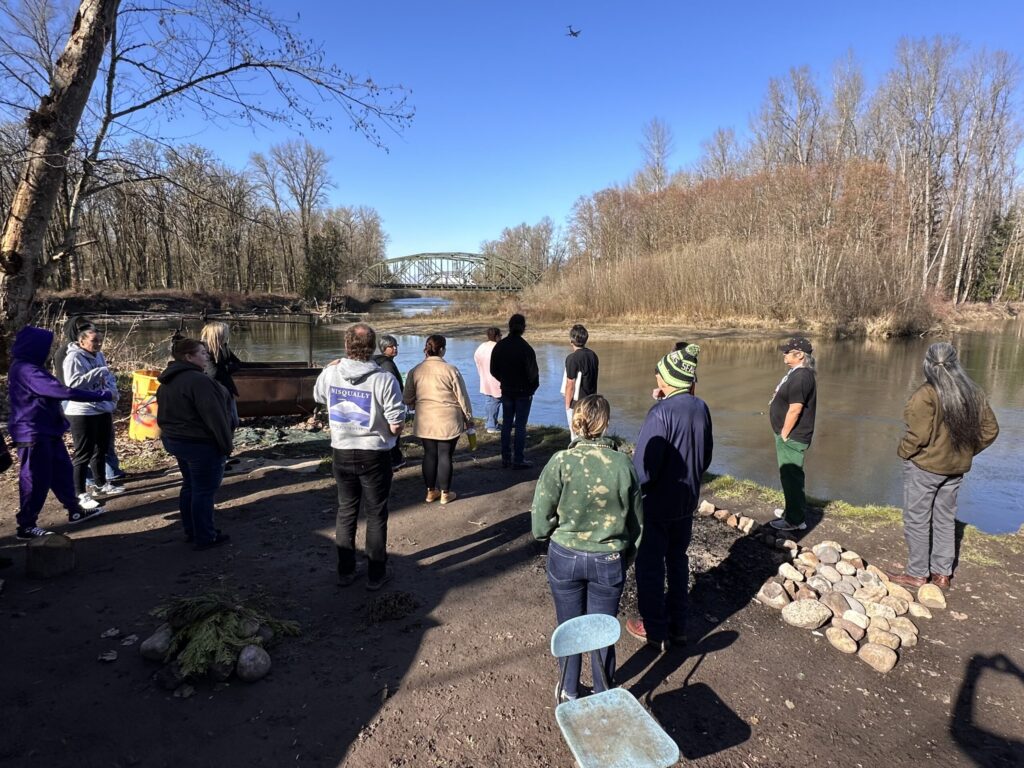If classrooms won prizes for the most outstanding fragrance, the outdoor education room at Paschal Sherman Indian School would be a frontrunner. It’s where students and staff process the traditional native foods they’ve harvested and the resulting aroma is one of the first things to strike visitors.
“It smells so good,” says PEI Associate Director, Columbia Basin & Coast Megan Rivard. “The space is so calming and healing. You can tell that it’s such a passion of this group of educators to connect their students to this place and to the other organisms that share it.”

Rivard and Central Washington FieldSTEM Coordinator Amber Yeager recently conducted a Project Learning Tree (PLT) workshop with Paschal Sherman teachers to support their goal of integrating the native plant garden into their curriculum. Around the same time, South Sound FieldSTEM Coordinator and PLT Coordinator Lara Tukarski and Lower Columbia FieldSTEM Coordinator Emily Newman led a PLT workshop with educators at Wa He Lut Indian School near Lacey, Washington. Both events were part of an intentional push to bring PLT resources to tribal schools.
“We had PLT money, and we specifically wanted to get these resources into the hands of teachers at those schools,” says Rivard.
“The [outdoor education room at Paschal Sherman] is so calming and healing. You can tell that it’s such a passion of this group of educators to connect their students to this place and to the other organisms that share it.”
— Megan Rivard, Associate Director Columbia Basin & Coast Region, PEI
At Paschal Sherman, the focus was on introducing PLT resources and getting teachers comfortable with the idea of using the school garden, which is flourishing under the management of Outdoor Education teacher Valerie Mason. “We wanted to help them understand that the garden is also their classroom,” says Rivard. “They can take their students out there any time. Valerie’s goal was to drive that idea home.”
Teachers responded positively to that message and were impressed with the PLT materials. One shared that while she initially believed that sporadic outdoor time was sufficient, now she realizes that it needs to be a regular part of students’ schedules.

PEI recently received grant funding through the Icicle Fund that will support a continuation of the work with Paschal Sherman. In the meantime, a climate science workshop focused on food waste and regenerative agriculture is already planned.
Across the state at the workshop with Wa He Lut Indian School, Columbia Basin FieldSTEM Coordinator Emily Newman was having a full circle moment. Her first teaching job was as a middle school math and science teacher on the campus. “It was such a cool thing to reconnect,” she says.
One goal of the Wa He Lut PLT workshop was to help teachers explore ways they could incorporate their campus, which includes the Nisqually River and is a short walk from Billy Frank Jr. National Wildlife Refuge, into their curriculum. “It’s an amazing space,” says Newman, “but a lot of educators didn’t know that it was okay to go outside with their class.”
Another goal was to connect PLT resources to the work educators are already doing, which includes using Carolina science kits. During the workshop, participants brainstormed ways they could connect outdoor learning with the material covered in the kits. “We went through some of the PLT activities and thought about how to adapt them,” Newman explains. “They didn’t have to use the whole activity but they could take the idea and modify it to fit their needs.”
Participants also got to meet Davy Clark, Program Director of Nisqually River Education Project (NREP). Clark already does programming with the school’s 5th-8th grade students, but most elementary teachers had never worked with him. “He was able to connect with them and share resources,” says Newman. “They’re right down the street from each other.”
During a campus mapping exercise, Wa He Lut principal Harvey Whitford pointed out an overgrown trail that was no longer in use. “It used to go from the school to the wildlife refuge,” says Newman. “The teachers got excited about the potential of reviving that trail, having the students work on a restoration project and connecting with the refuge again.”
Newman is encouraging the school to apply for an Outdoor Learning iGrant through OSPI to help fund that project and other outdoor learning priorities.
